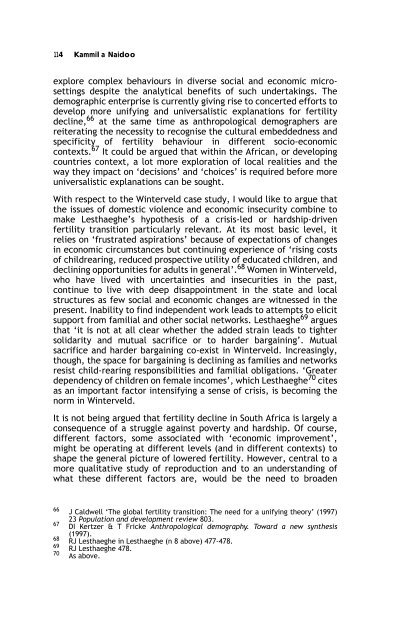Sex, Gender, Becoming - PULP
Sex, Gender, Becoming - PULP
Sex, Gender, Becoming - PULP
You also want an ePaper? Increase the reach of your titles
YUMPU automatically turns print PDFs into web optimized ePapers that Google loves.
114 Kammila Naidoo<br />
explore complex behaviours in diverse social and economic microsettings<br />
despite the analytical benefits of such undertakings. The<br />
demographic enterprise is currently giving rise to concerted efforts to<br />
develop more unifying and universalistic explanations for fertility<br />
decline, 66 at the same time as anthropological demographers are<br />
reiterating the necessity to recognise the cultural embeddedness and<br />
specificity of fertility behaviour in different socio-economic<br />
contexts. 67 It could be argued that within the African, or developing<br />
countries context, a lot more exploration of local realities and the<br />
way they impact on ‘decisions’ and ‘choices’ is required before more<br />
universalistic explanations can be sought.<br />
With respect to the Winterveld case study, I would like to argue that<br />
the issues of domestic violence and economic insecurity combine to<br />
make Lesthaeghe’s hypothesis of a crisis-led or hardship-driven<br />
fertility transition particularly relevant. At its most basic level, it<br />
relies on ‘frustrated aspirations’ because of expectations of changes<br />
in economic circumstances but continuing experience of ‘rising costs<br />
of childrearing, reduced prospective utility of educated children, and<br />
declining opportunities for adults in general’. 68 Women in Winterveld,<br />
who have lived with uncertainties and insecurities in the past,<br />
continue to live with deep disappointment in the state and local<br />
structures as few social and economic changes are witnessed in the<br />
present. Inability to find independent work leads to attempts to elicit<br />
support from familial and other social networks. Lesthaeghe 69 argues<br />
that ‘it is not at all clear whether the added strain leads to tighter<br />
solidarity and mutual sacrifice or to harder bargaining’. Mutual<br />
sacrifice and harder bargaining co-exist in Winterveld. Increasingly,<br />
though, the space for bargaining is declining as families and networks<br />
resist child-rearing responsibilities and familial obligations. ‘Greater<br />
dependency of children on female incomes’, which Lesthaeghe 70 cites<br />
as an important factor intensifying a sense of crisis, is becoming the<br />
norm in Winterveld.<br />
It is not being argued that fertility decline in South Africa is largely a<br />
consequence of a struggle against poverty and hardship. Of course,<br />
different factors, some associated with ‘economic improvement’,<br />
might be operating at different levels (and in different contexts) to<br />
shape the general picture of lowered fertility. However, central to a<br />
more qualitative study of reproduction and to an understanding of<br />
what these different factors are, would be the need to broaden<br />
66 J Caldwell ‘The global fertility transition: The need for a unifying theory’ (1997)<br />
67<br />
23 Population and development review 803.<br />
DI Kertzer & T Fricke Anthropological demography. Toward a new synthesis<br />
(1997).<br />
68 RJ Lesthaeghe in Lesthaeghe (n 8 above) 477-478.<br />
69<br />
RJ Lesthaeghe 478.<br />
70 As above.
















